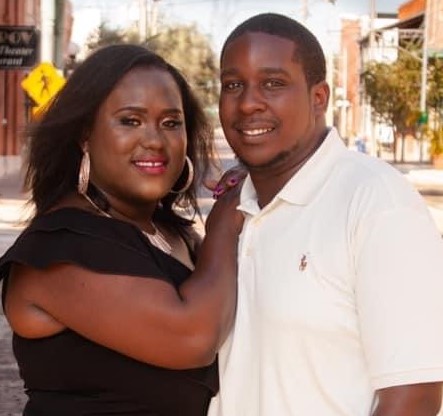
Family sees reprieve in Leon Cares funds possibility
St. Clair Murraine
Outlook staff writer
They didn’t know whether they’d qualify for the Leon Cares individual assistance program, but news that applicants could get financial help with meeting some essential needs brought a sense of relief for Alex and LaShaunba Patrick.
Their lives as a couple living on Tallahassee’s south side had been disrupted since the coronavirus outbreak in March. They went from a family with three incomes to having just one, with three children ages six months to seven years old.
They fell behind on paying their $750 per month rent. A car note of $340 was coming due and they had a utility bill on top of that.
“That can be hard just trying to sustain on one income when we have to eat, gas, along with keeping a roof and the electricity on,” LaShaunba said.

Photo submitted
On the surface, the Patrick’s seem to be the ideal candidate for the Leon Cares Individual Assistance program. The county opened a portal for applicants on Monday.
A total of $51.2 million was made available to Leon County through the federal CARES Act. Of that, $7.5 million has been allocated for the Individual Assistance program.
County Administrator Vince Long is familiar with stories similar to the Patrick’s.
“We recognize that this pandemic impacts everyone but it doesn’t impact everyone equally,” Long said. “There are people in our community who are much closer to the edge financially and that’s what these programs are for.”
The county is also taking applications from other entities that have been affected by the pandemic, including small businesses. Money is also designated to be spent on public health, human service, food insecurity-homelessness and childcare support.
The Patrick’s and every eligible household can get up to $3,000 in one-time assistance. It covers over-due rent, mortgage and utility bills. Money will not be sent to individuals, but instead to the landlord, mortgage company or utility company.
A list of all of the criteria for qualifying is available by visiting Leoncountycares.com or by calling (855) 203-6584 between 8 a.m.-6 p.m. Monday through Friday.
Availability of the CARES money comes just weeks after many of the potential applicants such as the Patrick’s lost $600 unemployment benefit weekly. That makes filling the void even more important for the county to launch its portal, said Mathieu Cavell, Assistant to the County Administrator for Community Relations and Resilience.
“Our county teams have worked so hard to make sure we set up as fast as we did,” Cavell said. “We know that it’s more than just a business or a front door to walk through. There are lives and livelihood at stake.”
Ernst and Young, a consulting firm, is providing technical assistance with the portal. The program will continue through December or until funds run out, Cavell said.
“This is a game-changer for Leon County,” said County Commissioner Bryan Desloge. “This is a seismic shift in the ability to help the community.
“We are certainly not going to solve every problem out there but we want to do everything in our power to make sure everybody is aware of this program.”
Individuals who apply have to be at least 18 years old and must be able to show at least a 25 percent loss of income since March. Applicants need to have worked at least 30 hours per week at the time they began to experience loss of income.
On the surface, it seems the Patrick’s could be qualifiers. She worked as a paraprofessional at Ruediger and also with an after-school program at Riley Elementary School. He was holding down a job at Summerset charter school in Jefferson County.
They lost the jobs and are getting by on Alex’s salary from his new job with the city utilities.
“It was challenging at first,” LaShaunba said. “We didn’t know how we would do. The rent was late, then accumulating late fees on top of fees. I’m having to request and extension on my car note.
“My largest bill is my rent so $3,000 would help us get out of the hole.”







